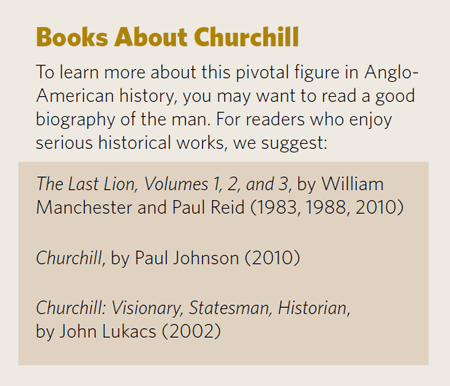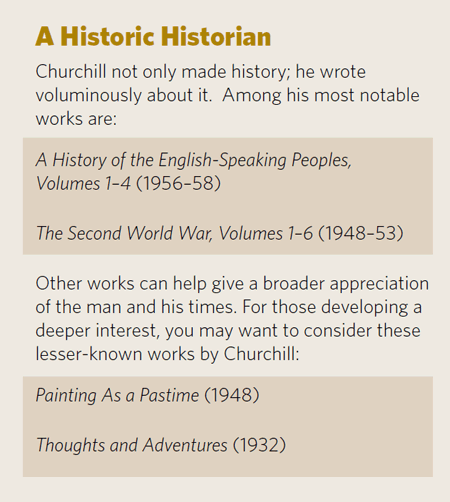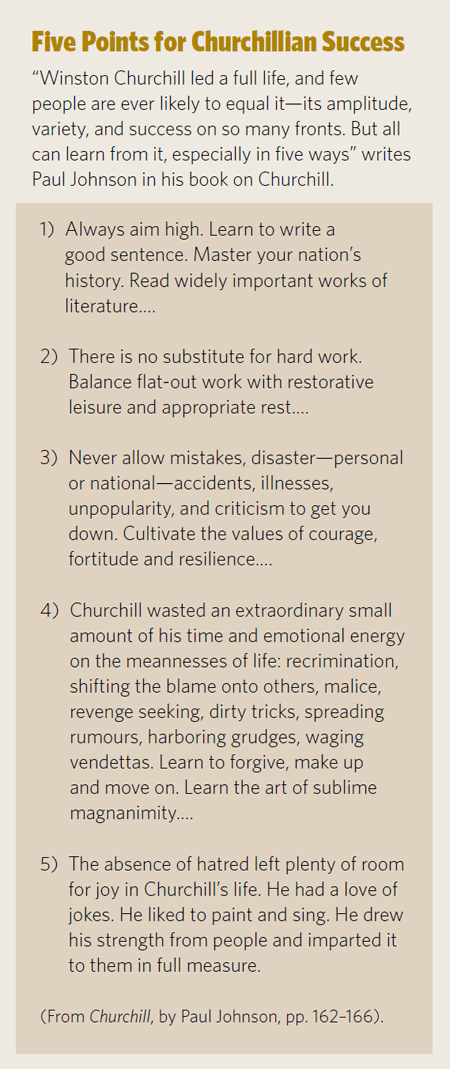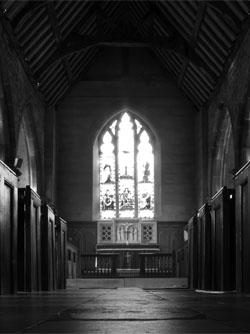Churchill: A Lifetime of Leadership
Fifty years after his death, and 70 years after he led Britain to victory in World War II, Churchill's legacy still looms large. What can we learn from this remarkable man?
"We are all worms, but I do believe that I am a glow-worm."
—Winston Churchill to Lady Violet Asquith, 1906
Throughout his long and combative political career, many concluded that Winston Churchill's character and leadership were simply not up to the demands of the highest political office. Nonetheless, Churchill "glowed" so brightly as Prime Minister in World War II that historians credit him with saving the United Kingdom from what otherwise would have been ignominious defeat.
At the 50th anniversary of his death, and the 70th anniversary of V-E Day, what lessons can we learn from the life of this remarkable man?
Born to Lead?
Winston Churchill was born in 1874 to an aristocratic English family made famous by the exploits of his forebear John Churchill, 1st Duke of Marlborough, who led English forces to success in the War of the Spanish Succession against the French (1701–1714). Subsequent generations of the family, however, were not nearly so distinguished. His father, Lord Randolph Churchill was a younger brother of the 8th Duke and married the American socialite and heiress, Jennie Jerome, making Winston half American.
Randolph was a Conservative politician whose driving ambition was to become Prime Minister. He was an outstanding speaker who rose to become Secretary of State for India and Chancellor of the Exchequer. But his career foundered and his life was cut short by illness; he died aged 43 in 1895. Winston idolized his father and saw his own future task in life as fulfilling his father's potential; he too would become a Member of Parliament.
Winston was very intelligent but not self-disciplined or well behaved at school. Yet, those who met him commented that even as a schoolboy Winston possessed unusual qualities that marked him out as extraordinary, with genius and the capacity to work hard and at a speed that would take him far in the direction he wanted to go.
Young Winston particularly had the strongest sense of his own personal destiny. Even as a teenager he had an uncanny intuition that one day he would be in command of the defenses of London and that he would save London, the nation and the Empire (In Search of Churchill, Martin Gilbert, p. 215). Most would not disagree that humanly he became the savior of his country, just as he had anticipated. Churchill saw himself as "a man of destiny, intended by Providence to play a heroic role on the stage of history" (Churchill, the Unexpected Hero, Paul Addison, p. 3).
From Battlefield to Ballot Box
From his youth, Winston knew he wanted to join the army after finishing his schooling. He trained for the cavalry with the explicit purpose of seeing action, gaining medals and making himself as widely known as possible before pursuing a political career in Parliament.
His strategy was to write about his exploits for British newspapers and in books, earning not just money, but also reputation along the way. He also immersed himself in continuous self-education, reading voraciously on historical and political topics to prepare for his chosen future. Later in life, he quipped that "history will be kind to me for I intend to write it."
Famously, he took part in battles in Cuba, India, Egypt, Sudan and South Africa before leaving the army in 1900 to further his political career by lecturing widely on his military experiences and the books he had written about them. By this time, he had become financially independent and so widely known—his biographer Robert Massie calls him "the most famous young man in England"—that he was able to win election as a Conservative Member of Parliament at the tender age of 26.
Driven to Succeed
It is said that Churchill's political career was like the ups and downs of the British children's game "Snakes and Ladders." First elected as a Conservative, he moved to the Liberal Party in 1904. An opponent of socialism, he nevertheless helped draft Britain's first unemployment pension law and pressed for budget reforms that would have greatly increased taxes on rich Britons to subsidize new and expanded welfare programs.
World War I, with its horrors of mustard gas and trench warfare, made a generation of Britons wary of military entanglements. Yet Churchill saw the importance of Britain's continued military strength. Returning to the Conservative Party in 1924, he served under Prime Minister Stanley Baldwin as Chancellor of the Exchequer until Baldwin's government fell to Labour, led by Ramsay MacDonald.
Thus began Churchill's "wilderness years." Having spent most of the previous 20 years in one key government post or another, Churchill endured his next decade in virtual exile among his more popular political colleagues. Few wanted to hear his message that Britain would face danger if it did not rebuild a strong military. Few took seriously his warnings of the growing threat posed by a resurgent Germany, chafing under the strictures of the Versailles Treaty.
A Turning Point
When Germany invaded Poland in September 1939, Britain declared war on Germany. Prime Minister Neville Chamberlain, who not long before had proclaimed "peace in our time" and championed his accord with Adolf Hitler, did not have the confidence of the British people. So who would lead Britain?
King George VI, whose job it was to nominate a new Prime Minister, consulted with top British leaders, and only one name consistently emerged as uniquely fit to lead Britain in its crisis time of war: Winston Churchill.
In retrospect, it is easy today to take for granted Britain's victory in World War II. But that victory was by no means assured in the dark days of 1940. John Lukacs, the eminent American historian, devoted his masterly book, Five Days in London: May 1940, to what he felt was the pivotal moment during the war: the final week of May 1940.

At that time, France was on the brink of falling, America and Russia had not yet joined the war, and Nazi troops were powering towards the Channel, putting the entire British army in northern France in imminent danger of being overwhelmed. Lord Halifax and British Prime Minister Neville Chamberlain, voices of appeasement in the UK Cabinet, pressed Churchill to ask Hitler for terms of surrender. German invasion of Britain was threatening and imminent, and Britain stood alone—all seemed lost. Lukacs summarizes, "during those five days in London, the danger, not only to Britain but to the world, was greater and deeper than most people still think" (p. xiii).
And upon one man's broad shoulders rested the decision only he could make. Would Britain throw in the towel, or stand and fight, come what may? Truly it was a defining moment… a turning point… that could have changed subsequent world history. Hitler would never come closer to victory than this fateful moment.
Surrender Unthinkable!
It was May 28, the eve of the Dunkirk evacuations, and Churchill's response to the entire Outer Cabinet—25 somber men seated around the table—was unequivocal. "Of course, whatever happens at Dunkirk, we shall fight on!... We shall go on and we shall fight it out, here or elsewhere, and if this long island story of ours is to end at last, let it end only when each of us lies choking in his own blood upon the ground" (Lukacs, pp. 2–5).
Churchill's words seared like an electric shock through Parliament and the nation. For this was not one man's resolve alone—it was overwhelmingly also the will of Parliament and the people. And then in rapid succession came his famous speeches that confirmed Britain would fight on and never, ever surrender. Truly, as American broadcast journalist Edward Murrow put it, Churchill "mobilized the English language and sent it into battle." It was closely accompanied by Churchill's grasp of history… of Britain, the Empire and America and their dominant values that made everything worth fighting for.

However, the war was not won then! Britain simply could not win it without the support of Russia and America, which was yet to come; but, importantly, "Churchill was the one who did not lose it. Then and there he saved Britain, and Europe, and Western Civilization" (Lukacs, p. 2). He bought time, the opportunity to fight on and prevail. And today we can be eternally thankful for Churchill and a hard-earned Allied victory—Britain, America and the empire standing together, brother to brother. We are only here today because of that notable victory.
The Will of God
Churchill was not a religious man, nor did he profess to be a Christian. "King and Country" for him was the nearest thing to religion, and Parliament is where he worshipped most. Yet he had a keen sense of divine guidance and the rule of law, as evident when he spoke to a joint session of the United States Congress on December 26, 1941, stating famously that a "great purpose and design is being worked out here below of which we have the honor to be the faithful servants."
Consider the words Lukacs uses to describe Churchill's eventual triumph: "[He] succeeded because of his resolution and—allow me to say this—because of God's will, of which, like every human being, he was but an instrument. He was surely no saint, he was not a religious man, and he had many faults. Yet so it happened" (p. 218). Was God in some way preparing Churchill for the fated hour? Indeed, his success seems to indicate that this was so.
Churchill's reputation was controversial throughout most of his life. He was clearly very clever, with flashes of pure genius, and was highly motivated to succeed, with a powerful ego. He possessed prodigious energy, drive, memory and powers of concentration, and his courage and bravery were never in question. He was a tenacious individualist, very sure of himself and his opinions, and built to lead from the front. He was an outstanding and fearless speaker with an intuitive grasp of problems and their solutions.
But, he could also come across as exceedingly pushy and arrogant, ambitious for office and power, boastful and belligerent. He was by nature conceited, impetuous and self-willed. Rarely did he acknowledge others or apologize.

Yet Churchill's wife Clementine was among those who recognized what she called the deeper "nobility of purpose" that his ambition strove to fulfill. "He sought to stand above the crowd not out of selfishness or vanity, but because he believed in the greatness of his country and the universal validity of the principles—above all that of individual freedom—that through the evolution of its long history it had come to represent" (Churchill, John Keegan, p. 172).
V-E day on May 8, 1945 saw the end of the war in Europe. Churchill had wanted to continue the wartime coalition until Japan, too, surrendered, but the Labour Party refused. In the resultant general election, Labour won by a landslide—a rejection more of the values of the Conservative Party than of Churchill himself. After many years of hardship, a majority of the country was won over by the plethora of Labour promises for a better life ahead. For Churchill this proved in retrospect a blessing. He was spared the agony of dealing with Britain's inevitable contraction of global power, the pain associated with the birth of Israel and the Korean War. It afforded time for a reduced workload with more powers delegated to younger men.
Churchill moreover could turn much of his attention to writing, and would become known for the four volumes of his History of the English-Speaking Peoples, and the six volumes of his very personal magnum opus, The Second World War, which indeed helped to fulfill his youthful boast that history would be kind to him, for he would write it.
Lessons for the Future?
Lukacs, in assessing the consequences of World War II, ends on a dark yet prescient note about the state of civilization. "At best, civilization may survive, at least in some small part due to Churchill in 1940. At worst, he helped to give us… 50 years. Fifty years before the rise of new kinds of barbarism not incarnated by the armed might of Germans or Russians, before the clouds of a new Dark Age may darken the lives of our children and grandchildren" (p. 219).
As of 2015, it has been 75 years—not just 50—since Britain's "darkest hour" and the desperate Battle of Britain in the skies above England. And the storm clouds of new forms of barbarism are indeed now rising.
Lukacs' cautionary words echo what the Bible tells us. The world has yet to go through an excruciating, short period of darkness, war and tyranny even worse than World War II. When this time comes, the world is going to need a true Savior to extricate it from the brink of oblivion—to light the way out of darkness into a new and permanent era of unlimited peace.
But this will not be another exceptional human leader like Churchill. This will be the returning, all-powerful King of kings, Jesus Christ, the Messiah Himself. And His face and character shines more than a little brighter than a glow worm; it shines like the sun (Revelation 1:13–16)!
In his 90 years, Churchill spent 55 years as a Member of Parliament, 31 years as a government minister and nearly nine years as Prime Minister. He was a prominent figure in World War I and a dominant one in World War II. Yet, along with his active life of public service, he also published some 10 million words in 40 books including his war memoirs, which gained him the Nobel Prize for Literature in 1953. He also painted more than 500 paintings to widespread critical approval (see Johnson, p. 162).
But humanity needs far more than this in the leader who will save us from World War III. Not only will Jesus Christ return to save humanity from destroying itself (Matthew 24:21–22), He will establish God's Kingdom on earth in which the glorified saints, by the grace of God, will reign with Him from Jerusalem and around the world (see Revelation 11:15–18; Revelation 5:10; 20:4).
What few today realize is that faithful Christians can be part of that glorious future! Those who repent, receive baptism and God's Spirit, accept Christ's sacrifice and live His Way are preparing for future roles of service—roles that will see them reborn in the Kingdom of God not as mere "glow worms" but as spirit beings shining with the radiance of God, serving a world where no one will learn war anymore.






